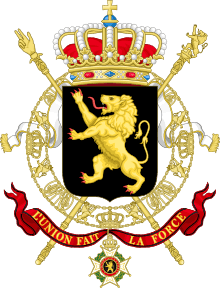Belgian general election, 1950
Belgian general election, 1950
.svg.png)
|
|
|
|
|
|
General elections were held in Belgium on 4 June 1950.[1] The result was a victory for the Christian Social Party, which won 108 of the 212 seats in the Chamber of Representatives and 54 of the 106 seats in the Senate.[2] Voter turnout was 92.6%.[3] This election was the last one in Belgian history were a single party achieved an absolute majority. Elections for the nine provincial councils were also held.
The elections took place a few months after the divisive referendum on restoring King Leopold III to the throne (the Royal Question). Following the election, a single-party Catholic government was formed with Jean Duvieusart as Prime Minister, who oversaw the return of King Leopold III, but who was quickly succeeded by Joseph Pholien as Prime Minister, following strikes and protests due to Leopold's return, which ultimately led to his abdication.
Results
Chamber of Deputies
| Party |
Votes |
% |
Seats |
+/– |
|---|
| Christian Social Party | 2,356,608 | 47.68 | 108 | +3 |
| Belgian Socialist Party | 1,705,781 | 34.51 | 73 | +7 |
| Liberal Party | 556,102 | 11.25 | 20 | –9 |
| Communist Party of Belgium | 234,541 | 4.75 | 7 | –5 |
| Liberal-Soclialist Kartels | 87,252 | 1.77 | 4 | +4 |
| Cosmocraten | 1,535 | 0.03 | 0 | 0 |
| Belgian Patriotic Party | 656 | 0.01 | 0 | 0 |
| Independents | 332 | 0.01 | 0 | 0 |
| Invalid/blank votes | 276,471 | – | – | – |
| Total | 5,219,278 | 100 | 212 | 0 |
| Registered voters/turnout | 5,635,452 | 92.62 | – | – |
| Source: Belgian Elections |
Senate
| Party |
Votes |
% |
Seats |
+/– |
|---|
| Christian Social Party | 2,210,712 | 47.19 | 54 | 0 |
| Belgian Socialist Party | 1,631,368 | 34.82 | 37 | +4 |
| Liberal Party | 526,575 | 11.24 | 10 | –4 |
| Communist Party of Belgium | 229,093 | 4.89 | 3 | –2 |
| Liberal-Socialist Kartels | 86,801 | 1.86 | 2 | +2 |
| Independents | 262 | 0.00 | 0 | 0 |
| Invalid/blank votes | 280,854 | – | – | – |
| Total | 4,965,665 | 100 | 106 | 0 |
| Registered voters/turnout | 5,635,452 | 88.11 | – | – |
| Source: Belgian Elections |
References
- ↑ Nohlen, D & Stöver, P (2010) Elections in Europe: A data handbook, p289 ISBN 978-3-8329-5609-7
- ↑ Nohlen & Stöver, pp 309–311
- ↑ Nohlen & Stöver, p291
